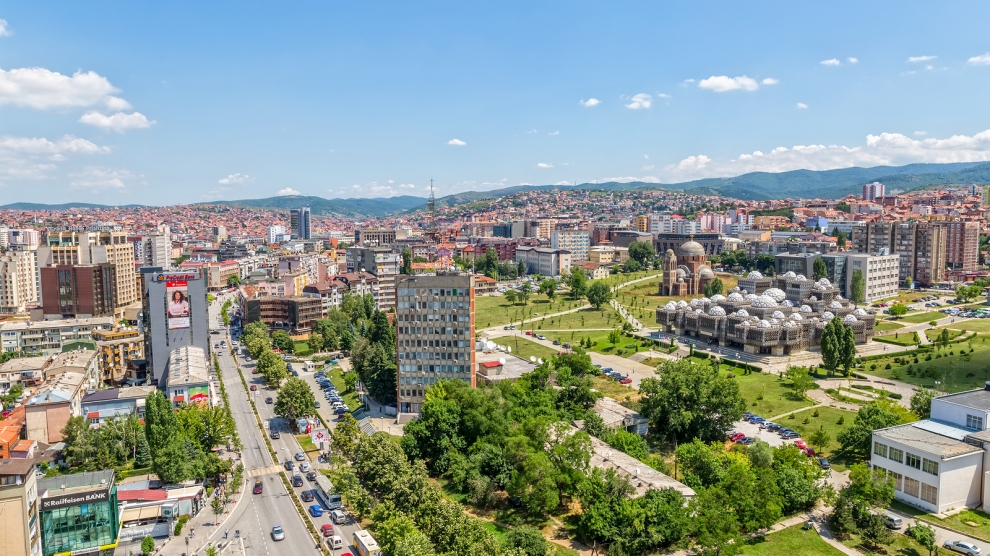As country boss of one of the leading institutional investors in Kosovo, few people are in a better position to offer a thorough perspective of the country’s investment climate than the EBRD’s Neil Taylor. One of the first pieces of insight he offers is that as a young country, Kosovo has exceptional opportunities that many other countries in Europe do not have, but that challenges remain.
“After independence, Kosovo was able to establish a new legal and regulatory system, modelling it on modern best practices,” he says. “To achieve the best results, Kosovo must continue to focus on consistent and timely implementation of legislation and strengthen the capacities of the judiciary and rule of law. The economy remains constrained by low productivity, high unemployment, a thin export base and limited foreign direct investment (around three per cent of GDP annually over the past five years). Businesses lack the know-how and capacity to expand, improve productivity and innovate. These challenges need to be addressed in order for the country to reach its full potential.”
While a young and growing population provides an ample supply of labour in contrast to most European countries, enhancing the quality of education and training is key to reducing skills mismatches.
“This is an issue which is often reported by companies,” says Mr Taylor. “Also, improving the quality of life and the business environment is necessary in order to reduce still high emigration and keep talented people at home. Kosovo’s economy is growing faster than its peers in the region but it needs to accelerate even more. The young generation of Kosovars represents perhaps a unique opportunity to achieve this.”
Mr Taylor also feels that improving the political relationship with Serbia would help to enhance the economy. “It would send the right signal to foreign investors. This would undoubtedly contribute to faster growth,” he adds.
In 2018, Kosovo’s economy grew by 4.1 per cent. The EBRD sees this as sustainable. “I think that we can expect Kosovo to sustain a growth rate of around four per cent in the medium term, or indeed even increase it if the business environment improves further.”
The energy question
The challenges that the EBRD wants to tackle in Kosovo are similar to those of the wider region: fostering the private sector’s potential, strengthening regional integration and connectivity, and addressing the energy challenge.
“We are well aware that energy is a crucial question in the Western Balkans where the majority of energy generation depends on coal and efficiency standards throughout the value chain leave considerable room for improvement,” says Mr Taylor. “This issue is probably nowhere more acute than in Kosovo. We are determined to make a strong contribution to help the country address this challenge and find sustainable solutions. Our focus is on energy diversification through renewable energy production, improving power transmission and supporting energy efficiency improvements. We are working closely with the authorities to finalise the regulatory framework in a form that will unlock significant investment in clean, domestic power. We are also working to improve residential energy efficiency by extending a number of credit lines and in 2018 we signed Prishtina up to our Green Cities programme.”
To promote the private sector, the EBRD is expanding its private sector finance and advice: “In 2018 we launched our new SME Competitiveness credit lines with two banks and made deals with three corporate and SME clients. This goes hand in hand with work to develop the sector sustainably through policy discussions on the investment climate and governance, and with advisory services to accelerate the growth of small businesses. More remains to be done on privatisation and we have offered to support the government’s intentions in this regard, starting with Kosovo Telecom.”
The EBRD also recognises that supporting connectivity, regional integration and infrastructure development is needed to improve Kosovo’s main transport links, strengthening cooperation with the region and beyond, and helping to attract foreign direct investment.
“Kosovo needs to build the main roads to Pan-European corridors, and update its railway network,” says Mr Taylor. “We have financed some transport projects but implementation needs to speed up. Municipal infrastructure is an additional area that offers significant investment opportunities. Last year we signed an MoU with the government on this and we plan to sign the first project under this envelope, the Gjilan wastewater treatment plant, very soon.”
The EBRD intends to be a long-term partner for Kosovo in each of these sectors and its goal is to crowd-in other investors where we can. “Last year we financed 52 million euros of projects in Kosovo, of which around three quarters in the private sector. Over the coming few years, and given the right conditions, we are aiming to increase our investment up towards 100 million euros a year.”
The euro
While not part of the eurozone, Kosovo makes use of the euro. Mr Taylor believes this brings both advantages and disadvantages.“On the positive side, use of the euro eliminates the risk of speculative attacks and exchange rate risks for businesses, allowing lower transaction costs. Interest rates can also be lower. On the other hand, there is no monetary policy independence, thus restricting options to respond to economic shocks. Benefits from using the euro can increase as Kosovo becomes more integrated with the European Union/eurozone and the institutional and business environment improves further.”
Mr Taylor sees three preconditions as being necessary for developing an entrepreneurial and innovative culture.
“Creating a legal and institutional environment in line with the EU approximation process, which is the region’s stated goal, is one. Progress here is essential also in order to mobilise investment. Investors need the protection of a well-functioning system based on the rule of law.
“A second important step is regional integration: building mutually supportive relationships with neighbours. Here, developments like the establishment of transnational business registries or the creation of a regional investment platform can be a step in the right direction and we are supporting Kosovo’s involvement.
“Third, Kosovo needs to overcome physical barriers such as the opening of border crossings and also eliminating tariff and non-tariff barriers to trade as all countries in the Western Balkans hugely benefit from more trade. They also gain a lot from, more than anything, the creation of an infrastructure that links the countries with each other and with the wider neighbourhood. Hard connectivity also includes addressing the energy needs of an economy fit for the 21st century, from generation through distribution to consumption. And speaking of the 21st century: Infrastructure today must include the components for a digital economy from fast internet to modern broadband.”
Positive examples
In terms of innovation, Mr Taylor highlights Kivo, a plastic recycling company, that the EBRD financed last year. The local entrepreneur partnered with an established Dutch business, learned best practice and technologies from them, and together they successfully launched a recycling plant in Kosovo. “This is a great example of taking innovation from abroad and we encourage more of Kosovo’s talented entrepreneurs to create these kinds of links in order to accelerate their business growth,” he says.
“Another good example of fostering innovation is the Innovation Centre Kosovo (ICK), which has been our partner for a few years now. The ICK has provided an initial home for new exciting companies such as J-coders, who provide training to young would-be programmers, and Zombie Soup, an ICT solutions provider that exports services to the US and EU. In fact, J-coders’ new initiative, Lab box, recently secured funding through ENIF, the enterprise innovation fund that we set up with other IFIs and the EU to stimulate entrepreneurship in the region. Creating an eco-system for start-ups in high potential sectors such as ICT, where Kosovo has a comparative advantage, is critical to create the next generation of local companies that can contribute to longer term growth.”
In sum, the EBRD wants to put in place an environment in which the private sector can flourish – by improving governance, and transport, and by providing businesses with access to finance and advice, among other things – is where governments and international organisations can help.
“We’ll know it has succeeded when the market takes over and it all starts happening by itself,” concludes Mr Taylor.
Read more about Emerging Europe’s Outlook on Kosovo Investment Conference, held in partnership with the EBRD, here: https://emerging-europe.com/outlook-on-kosovo/






Add Comment